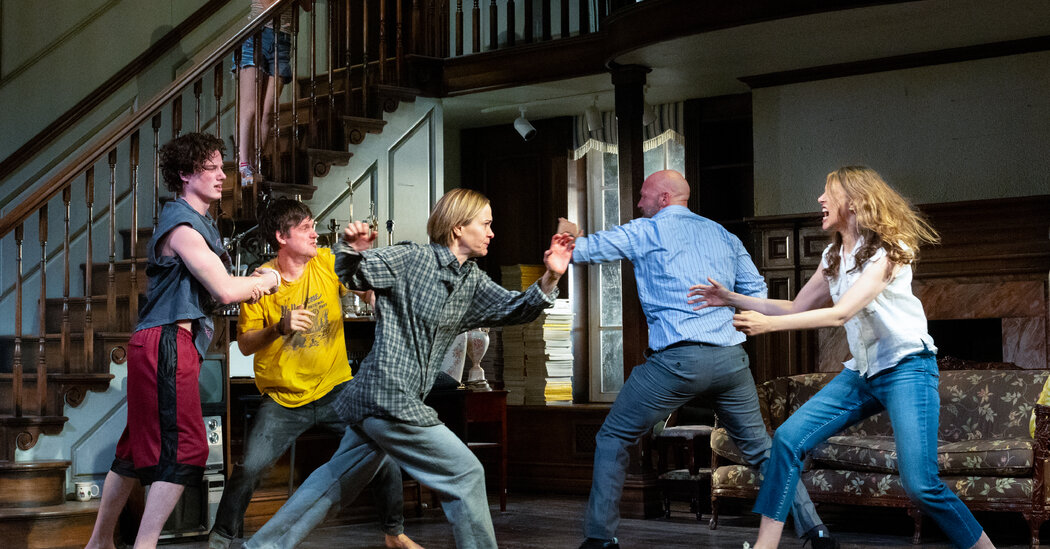Times Insider explains who we are and what we do, and delivers behind-the-scenes insights into how our journalism comes together.
I wasn’t sure whether I wanted to do my job.
That’s usually not a problem. As the chief theater critic for The Times, I enjoy the ritual of seeing plays during previews, thinking about them for a day or two and writing opening-night reviews.
But after Second Stage Theater announced in June that it would produce a revival of Branden Jacobs-Jenkins’s “Appropriate,” I dithered for months about covering it. True, it would be the play’s Broadway debut — and the playwright’s. Both are important milestones for the paper to acknowledge with a thoughtful response.
On the other hand, I’d seen “Appropriate” before, when it premiered Off Broadway in 2014. Other critics welcomed it as a serious play by a serious playwright.
I hated it.
That surprised me. The play’s subject — the legacy of racism in America — is something I care about deeply. And the plot is clever: Three white siblings bicker over the horrible souvenirs of slavery they find in their father’s plantation home. But the tone seemed too hectic and self-consciously outrageous to suit the subject.
“Is ‘Appropriate’ a comic tragedy? A tragic comedy?” I wrote in my review for New York magazine. “No, just a mess, undercooked and overexplained, with enough pregnant symbols (dark lake, shrieking cicadas, two graveyards) for an Ibsen festival.”
Rereading those words as the revival’s December opening approached, I cringed. That level of negativity is something I usually reserve for lazy retreads, jukebox musicals and corporate brand extensions with no aesthetic justification. Panning them feels like a duty and, let’s face it, a pleasure.
But as I’d learned in reviewing several other plays by Jacobs-Jenkins in the interim, he is too good when good to write off when not. The racial melodrama “An Octoroon,” I loved. The violent office satire “Gloria,” I disliked almost as much as “Appropriate.” And so it went, loving and hating. Earlier this month I named his latest play, “The Comeuppance,” one of the best of 2023. Was his output, I wondered, so variable? Or was I missing something on alternate occasions?
Worried it was once again time for a pan, and not wanting to pile on, I considered asking my editor to assign the review to one of our other critics, who might give the revival a fairer shot.
But it’s my job to grapple with plays whether I like them or not. I would go so far as to say that my up-or-down judgment is the least important part of my reviews, since readers will inevitably disagree with me, bringing their own taste, history and intelligence to bear.
That’s as it should be. If formal criticism has any value today, in a world of viable (or at least easily shareable) opinions, it’s in offering a more-or-less steady backboard for readers to bounce their own thoughts against.
With that in mind, I decided to review “Appropriate” after all. I took my seat at the Helen Hayes Theater on Dec. 14, resigned to the likely task of finding a new and gentler way — this is, after all The Times — to say what I said nine years earlier.
But I loved it. Instantaneously. So much for being a more-or-less steady backboard.
On the subway home I tried to sort out why my response was so different. I pondered the excellent direction, the powerful design and the blistering cast led by Sarah Paulson. The next morning, I read the 2023 script in tandem with the one from 2014. And though Jacobs-Jenkins had made what seemed to be a thousand improvements in the dramatic structure, the story remained what it was. In my rave review on Dec. 18, abandoning the pretense of critical inerrancy, I concluded that the real alteration was not in “Appropriate” but in me.
In 2014, I couldn’t tolerate a play that mixed hilarity and monstrousness so shamelessly. But time and history have altered that in me. In part thanks to Jacobs-Jenkins, I now see that hilarity and monstrousness are themselves bickering siblings, and that the possibility of reconciliation — in his fictional family or the American one at large — remains, as he knew all along, sadly remote.
And yet I find hope in “Appropriate” after all. If the theater can change even a theater critic’s mind, perhaps it can change anyone’s.
